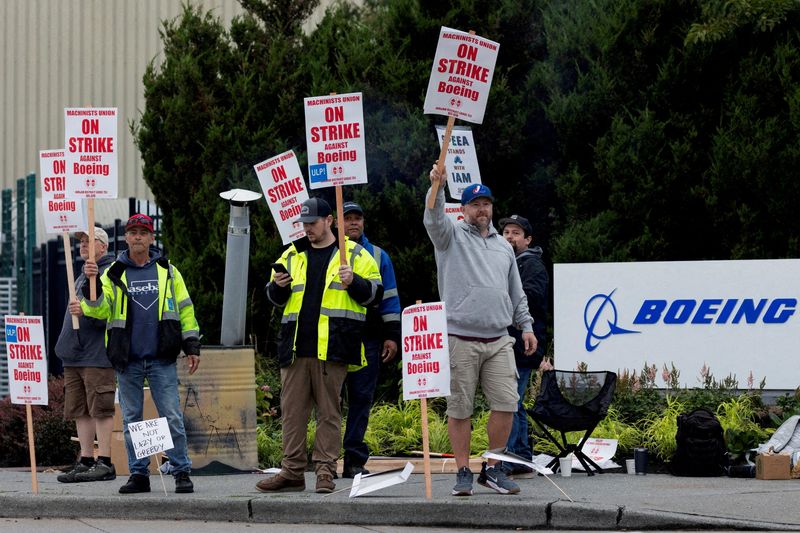By Dan Catchpole and Allison Lampert
SEATTLE (Reuters) -Boeing U.S. West Coast factory workers are voting on an improved contract offer on Monday that could end a seven-week strike and restart jet production at the troubled planemaker.
Boeing (NYSE:BA)’s latest offer includes a 38% wage increase spread over four years, up from a 35% raise in a proposal that was rejected by around two-thirds of the 33,000 striking machinists in a vote 12 days ago.
Boeing’s fourth offer since a strike started on Sept. 13 comes at a critical moment for the company, which last week announced a $24-billion share issue to shore up its finances after the strike halted production of its cash-cow 737 MAX jet.
The International Association of Machinists and Aerospace Workers said on Sunday that workers can return to their shifts as early as Wednesday if the offer passes, or as late as Nov. 12.
It is not clear how long it will take Boeing to get back to pre-strike production levels, although the strike is widely expected to delay to 2025 a year-end rate target of 38 jets per month.
While Boeing is not regularly disclosing monthly MAX production figures, CFO Brian West has previously said monthly output went from high single digits at the end of the first quarter to roughly 25 in June and July.
The 38% wage increase could add about $1.1 billion over the four-year contract to the workers’ cost base of about $2.5 billion, according to a note from analyst Jefferies.
The union’s District 751 President Jon Holden, who is negotiating on behalf of the workers, has endorsed the latest contract and warned workers that if they reject the deal Boeing’s next offer will be worse.
Boeing’s shares rose 0.4% around midday to $155.27, after rising on Friday on bets that workers would take the deal.
Voting ends at 7 p.m. U.S. Pacific Time (0300 GMT), with the result expected within hours.
Factory workers Reuters spoke to are divided on the latest contract, with some saying they are ready to return to work while others are willing to hold out for more benefits and the 40% wage increase they originally demanded.
A positive vote would offer some respite for Boeing CEO Kelly Ortberg who took over the company in August on a promise to mend relations with factory workers and bring about a “fundamental culture change” at the company.
Boeing has been lurching from crisis to crisis since January when the door panel blew off a near-new 737 MAX plane in midair, leading to the departure of Ortberg’s predecessor, Dave Calhoun.
Ending the stoppage, which has also halted production of Boeing’s 767 and 777 widebody planes, would also benefit aerospace suppliers that have been furloughing workers, as well as airlines facing aircraft-delivery delays.
Boeing’s latest offer eclipses recent pay gains by both the United Auto Workers in 2023 and IAM-unionized Airbus A220 factory workers this year. Many Boeing workers say it does not make up for a decade during which their wages lagged inflation and the loss of a defined-salary pension.
The union has said its members earned just four 1% wage increases over the last eight years.
“You have to have a second hustle in order to make it,” said machine operator Jeffrey Dodge, who has a side business growing mushrooms and selling tincture plant extracts.
Dodge, who is voting to reject the deal, said other workers near the Seattle-area Renton plant where he helps make 737 wings are also taking second jobs to cover basics.
Boeing has said the average annual machinists’ pay at the end of the four-year contract would be $119,309, up from $75,608 in the previous contract.
That raise is enough for some workers who are beginning to feel the pinch.
“I will probably say ‘yes’,” said Ian Hill, 29, who says he only makes enough money to live in a shared flat in a rough neighborhood where he sometimes hears gunshots at night.
“We should approve it, and in four years, try to get better.”

